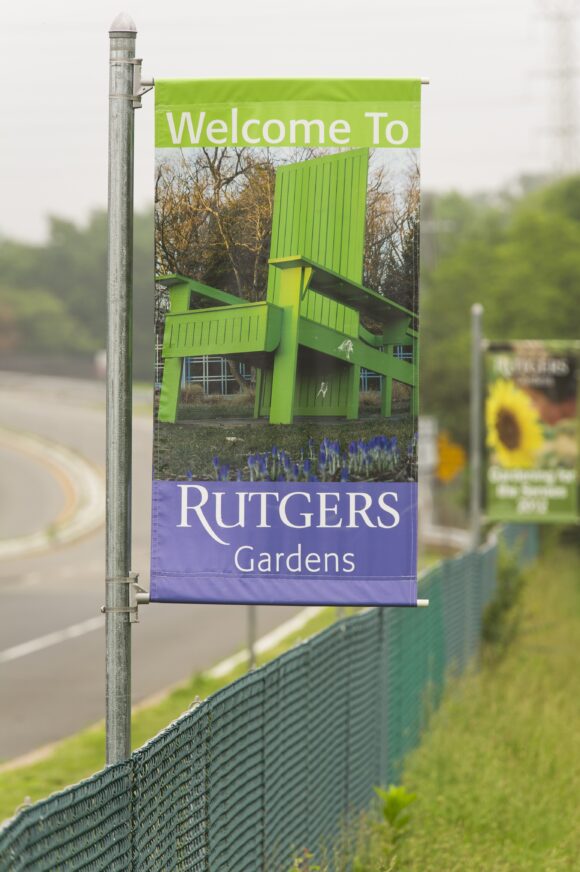Announcement by SEBS Executive Dean, Laura Lawson.
Dear Colleagues,

Rutgers Gardens banner.
Rutgers Gardens is a beloved space on campus that offers many opportunities for education, engagement, and enjoyment. The Rutgers Gardens strategic vision planning process is steadily moving forward, and we’ll have more to share in the coming months. Many of the stakeholders contributing feedback so far have confirmed what we recognize to be one of the key challenges to student and community use of Rutgers Gardens: access. As we prepare for the start of the new academic year, we are excited to share a creative approach to address this concern.
In addition to continuing to evaluate how students reach Rutgers Gardens at the traditional Ryders Lane location, we are beginning to implement strategies to bring the impact and experience of Rutgers Gardens to the core area of Cook Campus.
Through our Campus Stewardship initiative, we are integrating the management of Rutgers Gardens with that of other teaching-focused gardens, farms, and greenhouses within the School of Environmental and Biological Sciences. These growing spaces, which collectively meet aesthetic, ecological, food security, and wellness goals, serve as “living laboratories” that provide increased opportunities for experiential learning and community engagement. Connecting these growing spaces under one umbrella with shared management broadens their collective impact while contributing to the long-term sustainability of Rutgers Gardens through increased alignment with the Rutgers-New Brunswick Academic Master Plan.
Rutgers Gardens has traditionally operated in its primary location on Ryders Lane and will continue to do so, including the successful efforts of the Rutgers Gardens Student Farm. Under the Campus Stewardship initiative, Rutgers Gardens extends to include additional demonstration and learning spaces that are readily accessible for Rutgers students. Collectively, these satellite locations will include ornamental and ecological display gardens on Cook campus, including the Jones Avenue and Martin Hall urban gardens, the Cook Organic Community Garden, and the Floriculture greenhouse. In the months ahead, we will also explore how to better connect Helyar Woods and other university forests for maximum student success and community engagement while preserving key research initiatives.
We gratefully acknowledge the collaborative spirit and initiative of many people who have been involved in developing our existing garden, farm, and forest spaces and imagining what is possible. Thank you all! The success of this initiative relies on ongoing collaborations that integrate education, outreach, and research activities with proactive and responsive management of the physical spaces. To bring together the many collaborators and stakeholders who engage in this initiative, Lauren Errickson, Director of Rutgers Gardens and Campus Stewardship, will lead the efforts to unify these campus growing spaces. Lauren will serve as the SEBS point of contact for faculty, staff, and students interested in creating new or utilizing existing garden spaces on campus, and will liaise with the Office of Academic Programs, Rutgers Cooperative Extension, collaborating academic departments, IP&O- Grounds Operations, and other stakeholders connected to each garden area. Thank you, Lauren!
We welcome and encourage student, staff, and faculty participation in each of the SEBS-affiliated teaching gardens, farms, and greenhouses and anticipate that this collective management approach will increase our ability to offer student internships and hands-on learning opportunities for classes throughout the year. To learn more, please reach out to Lauren Errickson via email (lauren.errickson@rutgers.edu) or phone (848-932-7000).

